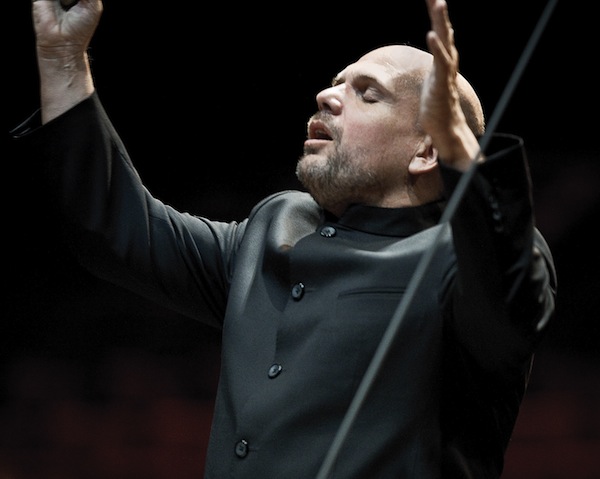Van Zweden, Dallas Symphony Orchestra offer a transcendent performance of Elgar’s “Gerontius”

Jaap van Zweden conducted the Dallas Symphony Orchestra and Chorus in Elgar’s “The Dream of Gerontius” Friday night. Photo: Hans van der Woerd
Elgar’s oratorio The Dream of Gerontius, long a repertoire standard in Britain, finally seems to be making an inroad into the American concert scene. The massive work arrived, long overdue locally, under the baton of Jaap van Zweden with the Dallas Symphony Orchestra.
No other work in the choral-orchestral repertoire—even among the iconic settings of the Roman Catholic requiem—takes on the issue of death on so personal a scale as does Gerontius. Inspired by Cardinal John Henry Newman’s 1865 poem, which narrates the journey of the human soul at and after the moment of death, Elgar drew on the rich chromaticism and opulent orchestration of Wagner, which he integrated into the British choral tradition to create, in Gerontius a relentlessly intense emotional experience.
And van Zweden produced a revelatory performance of this masterpiece. While some of the more striking moments—the grand choral climaxes in particular—take care of themselves in terms of pacing, other sections demand flawless instinct from the conductor. The slow build-up of the Prelude, essentially a description of the emotional state of a dying man, requires absolute command of timing and phrasing on the part of the conductor, and van Zweden here drew the listener in with irresistible magnetism. Similarly, the grand march that sends the Soul of Gerontius at the end of Part I, and which can lapse into late Victorian bluster all too easily, became, under van Zweden’s steady hand, a transcendent hymn to the triumph over death.
The Dallas Symphony Chorus, directed by Joshua Habermann, played its essential role flawlessly, easily ranging from the quiet unaccompanied whisper to the breathtaking grandeur only a well-trained 180-voice chorus can muster; Cynthia Nott’s equally well-trained Children’s Chorus of Greater Dallas provided the appropriately angelic moments to perfection.
Tenor Paul Groves displayed a voice with a distinctly resonant presence in the excruciatingly difficult role of Gerontius; while clearly up to the emotional challenges of portraying a human being who is dying and who then faces God and judgement, Groves occasionally faltered on the extreme ends of the range. Bass John Relyea, thunderously powerful in the double role of the Priest and the Angel of the Agony, suffered a bit of insecurity in Part I, but provided a fine, muscular rendition of his aria in Part II.
Alice Coote, however, proved radiant throughout. Along with a luxuriant tone quality, the British mezzo-soprano brought a striking command of dynamic range, producing a pianissimo as powerful and ear-grabbing as her majestic fortissimo. Her subtle delivery of the repeated “Alleluia” motif was, on each occasion, arresting in its beauty and In the emotional depth she imparted.
Van Zweden moves, after the 2017-18 season, from the very significant role as music director in Dallas to the heart of the country’s music scene as music director of the New York Philharmonic. Among the many gifts he has brought to the audience here, this first Dallas performance of The Dream of Gerontius will surely ranks as one of his finest and most memorable.
The program will be repeated 7:30 p.m. Saturday at Morton H. Meyerson Symphony Center. mydso.org; 214-849-4376.